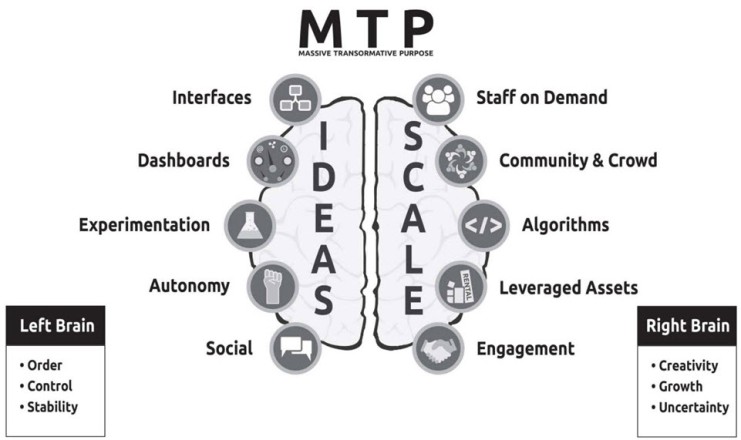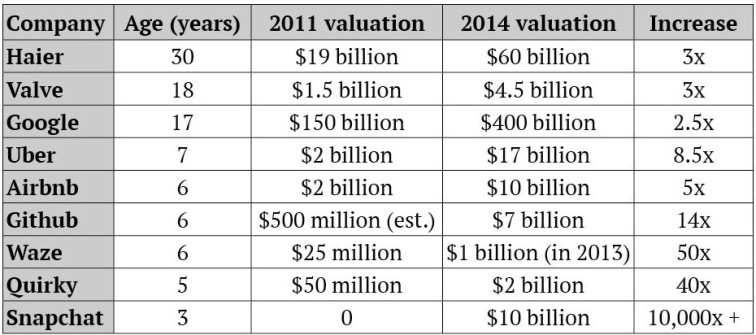Starting in 2011, I focused on the notion of a digital enterprise – a metaphor for the type of organization that is required to survive the massive paradigm shift that lies ahead. In 2013, the focus expanded to analyze disruptive scenarios and the emerging ecosystems and platforms that would give life to those scenarios. There remains a single constant through this work and the many leadership discussions that ensued: it will take a different type of organization – different than the ones most of us grew up with – to survive the shift. We as humans – and the organizations that we created – think and act linearly. The world and technology however is moving exponentially. How then do people and organizations move from linear thinking to exponential thinking?
In a recent book titled Exponential Organizations by Salim Ismail, the author does a magnificent job of describing the mechanisms that enable exponential thinking and organizations. The research conducted by the author and his colleagues (Michael S. Malone and Yuri van Geest) identified the major characteristics of Exponential Organizations (somewhat similar to what I have been calling Digital DNA). Based on their research (which included the top one hundred fastest growing startups worldwide over the last six years) they identified common traits across all exponential organizations. Common across these companies is a Massive Transformative Purpose (MTP). The MTP is the higher, aspirational purpose of the organization that aims to transform the planet. Exponential organizations (ExOs) intend to accomplish near-miracles – not the things found in most traditional mission statements.
Beyond the MTP, the author describes ten attributes that reflect the mechanisms that ExOs leverage to achieve exponential growth. They capture these using two acronyms: SCALE to reflect five external attributes, and IDEAS for five internal attributes. They use the two hemispheres of the brain as a metaphor to frame ExO attributes:
 Source: Exponential Organizations, Salim Ismail
Source: Exponential Organizations, Salim Ismail
I won’t go into detail here, as the book does a great job of describing the attributes and tactics companies big and small can leverage to implement them. Their research indicates that a minimum of four implemented attributes will achieve the ExO label. An exponential quotient was developed to measure organizations in the context of these ExO attributes. Google Ventures was identified as the benchmark company with an exponential quotient of 76 out of 84. Other notable companies that performed well are:
- Coca cola – exponential quotient of 62 out of 84
- The Guardian – exponential quotient of 62 out of 84
- General Electric – exponential quotient of 69 out of 84
- Amazon – exponential quotient of 68 out of 84
- Zappos – exponential quotient of 75 out of 84
- ING Direct Canada – exponential quotient of 69 out of 84
These companies excel at several of the 10 attributes, and high performance is directly correlated to their focus in these areas. So who are the leading ExOs and how has it translated to performance? This chart from the book lists the top ExOs and the related performance increase:
 Source: Exponential Organizations, Salim Ismail
Source: Exponential Organizations, Salim Ismail
I’ve spent some time mapping these attributes to my evolution guide and found a consistency in findings and approach. Although the labels are different, the intended outcomes are the same – that is, enabling a set of organization characteristics (Digital DNA) that allows an organization to survive the shift. The same is true in mapping the enablers (in their case SCALE and IDEAS):
Another recent article titled Exponentials was recently published by Bill Briggs and Marcus Shingles. This work in concert with Singularity University underscores both the speed of the coming paradigm shift, and the urgent need to become an exponential organization. The urgency should be felt by leaders everywhere to position their organization for life in an exponential world. I highly recommend the book.


[…] Starting in 2011, I focused on the notion of a digital enterprise – a metaphor for the type of organization that is required to survive the massive paradigm shift that lies ahead. In 2013, the focu… […]
LikeLike
Evening Frank. I read this with avid interest. In the here and now of 2015, two years behind, we’re still dealing with the platforms and ecosystems mindset shift. We’re moving as fast as we can to help businesses cope and it’s a job and a half I tell you.
LikeLiked by 1 person
It’s more like 3 jobs! Alas, our current speed just won’t get it done. I wish there was a silver bullet. But it just gets more an more clear that traditional companies are just not structured for this. Very good book by the way!
LikeLike
[…] Starting in 2011, I focused on the notion of a digital enterprise – a metaphor for the type of organization that is required to survive the massive paradigm shift that lies ahead. In 2013, the focu… […]
LikeLike
[…] Starting in 2011, I focused on the notion of a digital enterprise – a metaphor for the type of organization that is required to survive the massive paradigm shift that lies ahead. In 2013, the focu… […]
LikeLike
[…] a recent post, I discussed a book on exponential organizations co-authored by Salim Ismail, Global Ambassador for […]
LikeLike
[…] through this lens, versus the massive implications of these future scenarios viewed through an exponential lens. The ensuing dialog focuses […]
LikeLike
[…] through this lens, versus the massive implications of these future scenarios viewed through an exponential lens. The ensuing dialog focuses […]
LikeLike
[…] aims to transform the planet; referred to as a massive transformative purpose in a recent book on exponential organizations. When you consider the value that the millennial generation places on purpose, it is clear that […]
LikeLike
[…] aims to transform the planet; referred to as a massive transformative purpose in a recent book on exponential organizations. When you consider the value that the millennial generation places on purpose, it is clear that […]
LikeLike
[…] Still another point of view is articulated by Singularity University in their work on Exponential Organizations. […]
LikeLike
[…] Exponential organization model via Singularity University […]
LikeLike
[…] […]
LikeLike
[…] aims to transform the planet; referred to as a massive transformative purpose in a recent book on exponential organizations. When you consider the value that the millennial generation places on purpose, it is clear that […]
LikeLike
[…] Exponential Orgs; Dupress; Yuri Van Geest Slideshare; FrandDiana; Octavio Urzua; The Next Web; Diip Site; Diip […]
LikeLike
[…] in their popular book titled Exponential Organizations, the authors provide many examples of structural change; from the asset-heavy to asset-light […]
LikeLike
Still no Silver Bullet, But in six sigma we focus on CTQ’s [Critical to Quality]. Can we prioritize and identify what is most ‘Critical to Exponential Status’
LikeLiked by 1 person
[…] and 60 ExOs around the world that deliver extraordinary results. And they all synthesise the successful embedment of different organisational styles, all able to scale the edges. Deloitte and Singularity […]
LikeLike
[…] Exponential Orgs; Dupress; Yuri Van Geest Slideshare; FrandDiana; Octavio Urzua; The Next Web; Diip Site; Diip […]
LikeLike
[…] https://www.slideshare.net/vangeest/exponential-organizations-hal-organizations/ […]
LikeLike